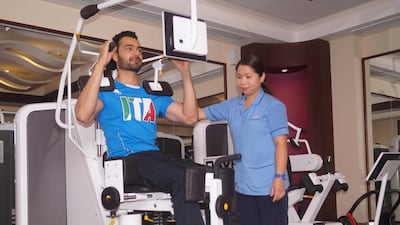Two hospital groups in the UAE have launched rehabilitation programmes for patients reeling with health issues after recovering from Covid-19.
RAK Hospital and Amana Healthcare have announced therapy programmes to help patients left with serious health issues and impairments after beating the coronavirus.
On Monday, the country announced a 90 per cent recovery rate among patients with the majority making a full recovery.
In a few cases, though, health problems linger on and patients may need support to get back to normal lives.
RAK Hospital’s free-of-cost programme offers physical, cognitive, dietary and psychological support to patients.
According to World Health Organisation studies, in severe cases, the virus could leave sufferers weak and dependent on walking aids and the assistance of others to complete basic tasks such as washing, dressing and walking.
These patients, many of whom have spent weeks in an ICU, might need intensive rehabilitation to return to a normal life.
“We decided to launch the Covid-19 rehabilitation programme entirely free-of-cost for those UAE residents who have recovered from the infection, to enable them to return to enjoying normal life with their families,” said Dr Raza Siddiqui, executive director of RAK Hospital.
Amana Healthcare, which operates hospitals in Abu Dhabi and Al Ain, has also launched a similar therapy programme.
“Amana has devised a four-stage process that helps to restore the physical and cognitive functions that are often diminished in the aftermath of the disease, particularly over long periods of care in an ICU,” said Dr Jason Gray, senior director for clinical operations at the group.
“Recovery brings new challenges, such as regaining breathing functions, physical movement, muscle strength, and healthy body weight and composition.
“Cognitive functions such as attention, memory and mood may also present psychological challenges. This is when the rehabilitation phase begins.”
Having contracted Covid-19, Shamilah Ahmada is now undergoing the intensive rehabilitation programme at one of the hospitals of the group.
“I have therapists looking after me, who care about not just my physical health, but also cognitive wellbeing,” she said.
“It gives me the strength to continue to fight the impact of this virus. I don’t feel alone anymore.”
Ms Ahmada said the programme gives her the confidence that she will eventually return to her earlier lifestyle.
"I hope to be able to get back to my normal life, and to my job and the hobbies I enjoyed. I can see improvement in myself daily and I hope to continue to make progress until I reach my goal.”
Deborah Pierce, director of rehabilitation at Amana Healthcare, said the objective of the programme is to get patients back to the lives they lived before getting infected by the coronavirus.
“Some patients need help getting off a ventilator but for many patients, the challenge is to regain strength, mobility and independence after spending weeks immobile or comatose in a hospital bed,” she said.






